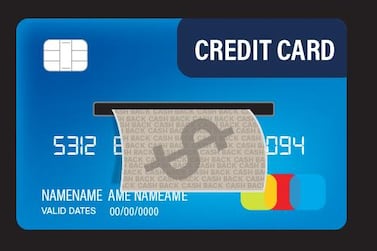Among US millennials aged 18 to 29, those with a college degree are the savviest in using credit cards and most confident in money management skills, according to the latest "Majoring in Money" report from Sallie Mae and Ipsos.
More than 70 per cent had decent credit scores above 650, with 40 per cent in the excellent range of 750 to 800.
By contrast, college students and those who never finished a degree used credit cards much less frequently and had lower credit scores. Only 20 per cent of students and 8 per cent of non-completers had excellent credit, according to the survey.
“College graduates are more likely to have a credit card in their wallet, but are also the most likely group to say they pay their credit card balance in full each month,” said Julia Clark, senior vice president of Ipsos, a global independent market research company.
The 2,419 online interviews were conducted from December 2018 through January 2019 by Ipsos and Sallie Mae, a US consumer banking company.
When it comes to paying for purchases, debit cards are the most frequently used payment method. While 81 per cent of young adults still carry cash, 89 per cent of college graduates, 85 per cent of college students and 91 per cent of non-completers use debit cards.
“Overall, they more frequently use a debit card. They are more comfortable,” Marie O’Malley, senior director of consumer research at Sallie Mae, told Reuters.
Mobile payments were popular with 88 per cent of college graduates, 86 per cent of students and 78 per cent of non-completers, most often citing PayPal and Venmo.
The majority have at least one credit card, but at a lower percentage than the other methods of payment: 83 per cent of graduates, 57 per cent of college students and 61 per cent of non-completers.
This can be an issue for establishing credit. Debit cards do not get reported to the credit bureaus and, therefore, have no impact on your credit score, said Amy Thomann, head of consumer credit education at TransUnion, one of the three main credit reporting bureaus in the US.
There was also a significant difference in paying credit card bills when comparing college graduates and students with non-completers. While 97 per cent make at least the minimum payment, 64 per cent of college graduates and 60 per cent of college students report paying credit card bills in full each month, compared to 32 per cent of non-completers.
College graduates are the most confident in their financial know-how, with 71 per cent rating their money management skills as good or excellent. In comparison, 59 per cent of college students and 42 per cent of non-completers rate themselves the same way.
Overall, though young adults demonstrate fiscal responsibility in a number of ways. More than 90 per cent of college graduates, 72 per cent of college students and 84 per cent of non-completers pay their bills on time. The majority in each group say they track their spending and never spend more than they have.
When it comes to saving, 62 per cent of college graduates, and half of college students and non-completers are saving money every month. Around 40 per cent of college graduates say they have an emergency fund, compared to 22 per cent of college students and 31 per cent of non-completers.
Young adults are interested in further developing their money management skills, and the report highlights the need to do so. When put to the test via a four question, multiple-choice quiz on interest and the cost of credit, only 24 per cent of college graduates, 18 per cent of non-completers and 10 per cent of students answered all questions correctly.
“We’re all lifelong learners, and it’s especially true when it comes to financial literacy,” said Raymond Quinlan, chairman and chief executive of Sallie Mae. “While real-world experience can contribute to a better grasp of financial matters, a relationship between completing college and financial management success is clear.”








